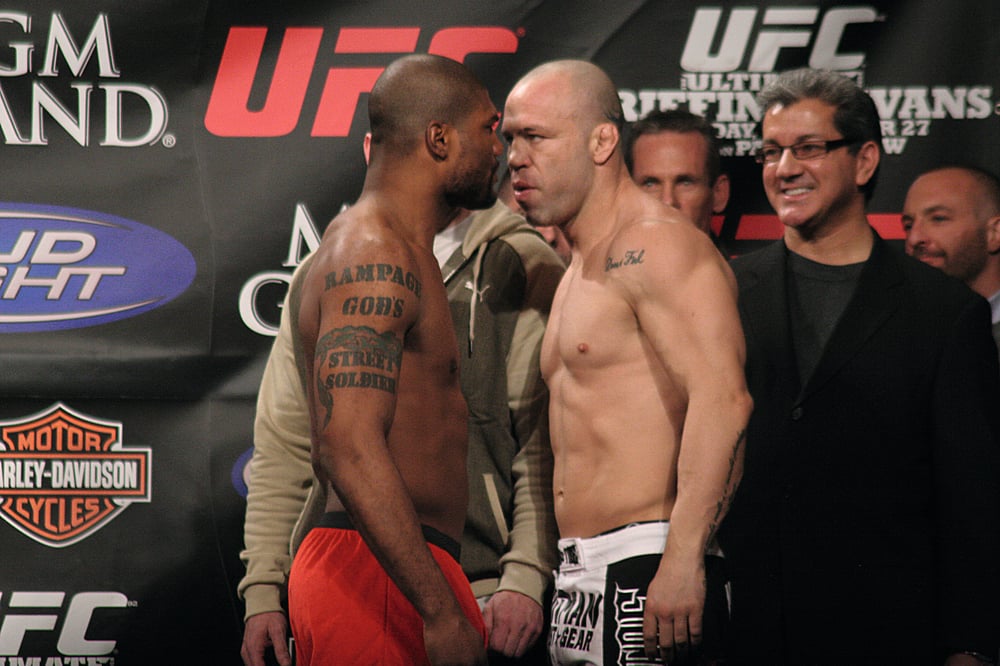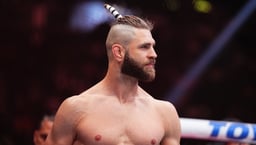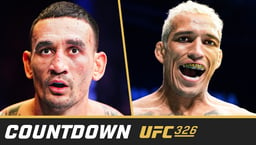
Issue 056
November 2009
The date is December 26, 2008. The scene is the MGM Grand in Las Vegas, and over 3,000 people are going nuts.
Rampage Jackson, sporting bright orange shorts, has just stepped off the scales and is now snarling directly in the face of a man who has twice destroyed him in the past. The man in question is Wanderlei Silva, who possesses such an emphatic mental stranglehold over Jackson that he may as well be wielding the blade that his ‘Axe Murderer’ moniker professes.
Suddenly there’s an exchanging of words, the air turns a dark shade of blue and it is Wanderlei who caves – shoving his foe across the stage before storming out of the building with the trademark sound of a Rampage ‘howl’ ringing in his ears.
In one significant moment the tables had turned, the tide had shifted; the psychological advantage that had previously resided in the Wand Fight Team had upped sticks and joined Rampage Jackson’s camp. Rampage had won the psychological war.
“If a fighter gets under his opponent’s skin it is the equivalent of getting the plague,” warns MMA psychologist Joe Bell. He’s right. Just 24 hours after that December weigh-in, the plague paralyzed Wanderlei’s body and Jackson reigned triumphant.
“I would say most elite sports are split 80% psychological and 20% natural ability,” adds Bell. “If you’ve got an elite athlete whose head isn’t in the right place, it doesn’t matter how good he is, he just will not be able to tip the balance without the right psychological preparation.”
That’s 80% psychological and 20% natural ability. Can the outcome of a fight really be weighed that heavily in favor of psychology?
Surely Brock Lesnar is going to pound on you, regardless of whether he has spent all day helping old ladies cross the road or doing his visualization exercises. Bell uses the Dan Hardy-Marcus Davis fight at UFC 95 to exemplify his point: “Dan Hardy got under Marcus Davis’ skin before the fight, no doubt. You could hear Davis’ coach say to him ‘just shut this kid up’. That should not be the goal of any fighter; you have to remain focused on your game plan, but clearly that got lost in the Davis camp. I’d put money on it that Hardy got under Davis’ skin and that’s where the American lost the fight.”
Therein lays the beauty of MMA. Push the right buttons, pull the right levers, and any fighter in the world can be brought down to Earth. However, push the wrong buttons, warns Bell, and you awaken the beast.

The psychological warfare aspect in MMA is a ticking bomb of possibilities that runs far deeper than mere trash talk. It demands the type of self-motivation that was missing when Georges St Pierre lost to Matt Serra, it requires the ability to bounce back from defeat that Chuck Liddell displayed in his trilogy with Randy Couture, and it depends hugely on an individual’s belief in his own ability – thus rendering trash talk something of a hazardous minefield. Bell provides an example. “We saw it with Brock Lesnar vs Frank Mir. Frank beat Brock fair and square in their first fight and Brock undoubtedly would have harbored some doubts in himself and his BJJ going into the rematch. But Frank made the mistake of getting under Brock’s skin, and on this occasion Brock had the strength of character to turn that situation into a positive, and pounded the shit out of Frank. The trash talk backfired on Frank because all it did was anger the monster.”
So what defines whether a fighter can be stirred or staggered by mind games? What makes Tito Ortiz the master of trash talk against Ken Shamrock, but the clown of the class against Chuck Liddell?
Against Shamrock, the ‘Huntington Beach Bad Boy’ was calmness personified, laughing in Shamrock’s face when he promised to beat Ortiz into ‘a living death’. By the time Ortiz came to face Liddell (a painful experience for Tito), it was the bleached-blond wrestler who took on Shamrock’s frustrated guise, as Liddell blanked all efforts to rile him. “The effect of trash talk depends a lot on whether the target understands what’s happening and how well-prepared he is to defend against those attacks,” explains psychological guru Dr Randy Borum. “A successful fighter must have the capacity and discipline to control his reactions and to regulate his own confidence and focus.” Bell agrees with Borum on this. “You have to remember, trash talk is often employed by competitors who are slightly fearful themselves, so they are looking for a way to release that fear. Hence Ortiz was fearless against Shamrock, but not so against Chuck.”
One man who exhibits impressive self-control, maybe more than just about anybody else in MMA, is UFC welterweight champion Georges St Pierre. The Canadian has often been the target of psychological warfare over the years, not least when labeled a quitter by BJ Penn, but he lets his fighting do the talking – the best response in Bell’s eyes. “The best way to deal with trash talk is just to not engage at all. If you refuse to get involved, you disempower the opponent. If they start trash-talking you and you take that bait, they are in the driving seat. But if you ignore it, you give them no weakness to exploit.”
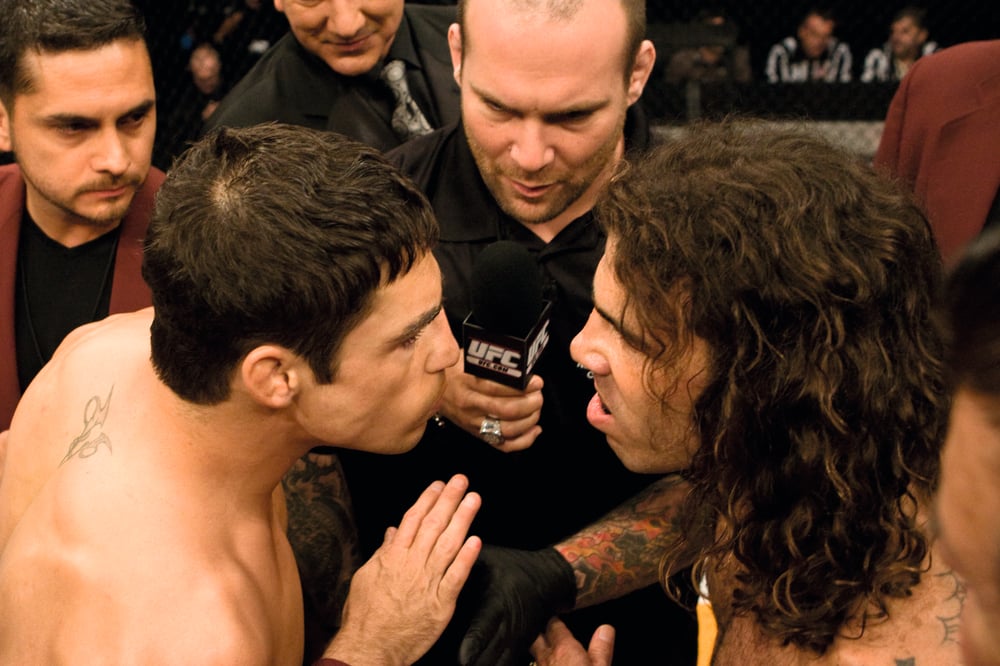
Conquering the mind games outside the Octagon is only half the battle. When the door slams shut behind two warriors on fight night, they enter a whole new realm of mental examination: the stare-down. It’s the last chance to induce fear into an opponent, the last chance to put a foe on the back foot, the last chance to sow those seeds of doubt.
Rampage Jackson’s face-to-face blockbuster with Marvin Eastman, which generated an image every bit as explosive as the winning uppercut itself, is the classic stare-down of recent times, but for absolute perfection in the art of intimidation Joe Bell turns to Fedor Emelianenko. “The best when it comes to the stare-down is Fedor Emelianenko. Watch him: He does not make eye contact, and his entire expression is extremely relaxed – you would think he is about to perform a ballet or something. But here is the crucial thing. When the referee tells them to head back to their corners, Fedor suddenly darts a short look directly at his opponent – or through his opponent I should say. This kind of look is associated with antisocial behavioral disorders and psychopaths: They don’t look at you; they look through you. It’s emotionless, it goes deeper than skin level. You will get a lot of fighters who will catch that look and suddenly realize they do not want to be there. Wanderlei Silva has a stare-down that makes you think ‘this is gonna hurt’, but Fedor’s makes you think ‘shit, I might die’.”
Crucially, all of the above (the trash talk, the mind games, the stare-down) only serve to influence one solitary fight, but when it comes to defining a fighter’s career, one outstanding factor makes or breaks an individual according to both Bell and Borum: The ability to learn from defeat. “Research conducted by Stanford psychology professor Carol Dweck, has shown that most people have one of two types of ‘mindset’: fixed mindset or growth mindset,” explains Borum. “Those with a fixed mindset believe that their positive traits and potential for success are essentially fixed. Losing can be devastating for a fixed mindset competitor because they will assume they lost because they were ‘just not good enough’.
“On the other hand, those with a growth mindset are more grounded in ‘possibilities’. They believe that positive traits and skills can be developed and that they can overcome failures to ultimately achieve success. Georges St Pierre demonstrated the advantages of a growth mindset after losing his UFC title to Matt Serra. St Pierre consulted a sport psychologist, who helped him realize that ‘it isn’t always the best team that wins the game, it’s the team that plays better’.”
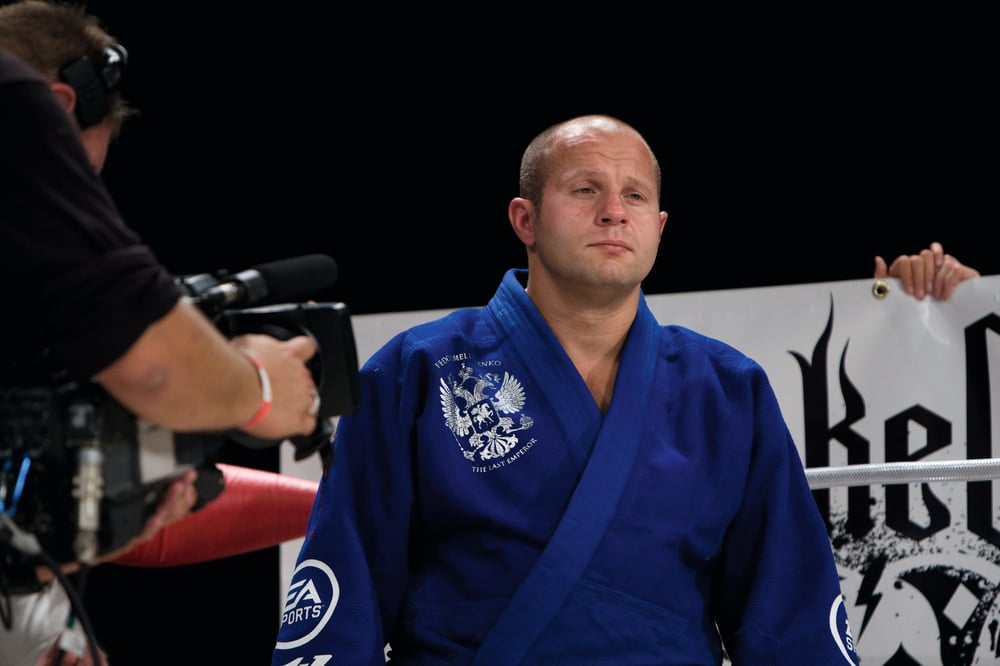
Psychologist Joe Bell elaborates on Borum’s point, questioning whether Michael Bisping has the necessary mindset to follow St Pierre’s blueprint for success after his first ever knockout loss at the hands of Dan Henderson. “St Pierre is a self-reflective individual who acknowledged he had things to work on, he went away and corrected them and came back as one of the best fighters in the world,” comments Bell. “Michael Bisping, on the other hand, suffered a knock-out that came as a result of a novice error – but look for any post-fight reaction and it is extremely hard to find.
“That says to me that he is licking his wounds. I think for the first time in Michael’s career he experienced fear. Bisping is a really fit lad, but at the end of round one his hands were on his knees and what he was experiencing was an adrenaline dump caused by fear. He felt Dan Henderson’s power and he knew his own punches weren’t as hard as that. If Bisping gets ahead and sets the tempo of a fight, he is one of the best in the business at staying ahead, but at that moment when he gulped in those deep breaths, he was thinking ‘shit’, and that was when the fight was lost.”
Bisping is not the first man to face adversity and come back strong. MMA has produced a highlight reel of winners and losers over the years, images of the broken Jens Pulver sitting aty BJ Penn’s feet, or the grinning Kazushi Sakuraba reduced to a bloody mess, sit right alongside images of an adrenaline-pumped Brock Lesnar, or jubilant Anderson Silva. The psychological warfare waged pre-fight is usurped only by the mental examinations posed post-fight, but one thing is for sure – only the strongest characters survive.
Crucially, all of the above (the trash talk, the mind games, the stare-down) only serve to influence one solitary fight, but when it comes to defining a fighter’s career, one outstanding factor makes or breaks an individual according to both Bell and Borum: The ability to learn from defeat. “Research, conducted by Stanford psychology professor Carol Dweck, has shown that most people have one of two types of ‘mindset’: fixed mindset or growth mindset,” explains Borum. “Those with a Fixed mindset believe that their positive traits and potential for success are essentially fixed. Losing can be devastating for a fixed mindset competitor because they will assume they lost because they were ‘just not good enough’.
“On the other hand, those with a growth mindset are more grounded in ‘possibilities’. They believe that positive traits and skills can be developed and that they can overcome failures to ultimately achieve success. Georges St Pierre demonstrated the advantages of a growth mindset after losing his UFC title to Matt Serra. St Pierre consulted a sport psychologist, who helped him realize that ‘it isn’t always the best team that wins the game, it’s the team that plays better’.”
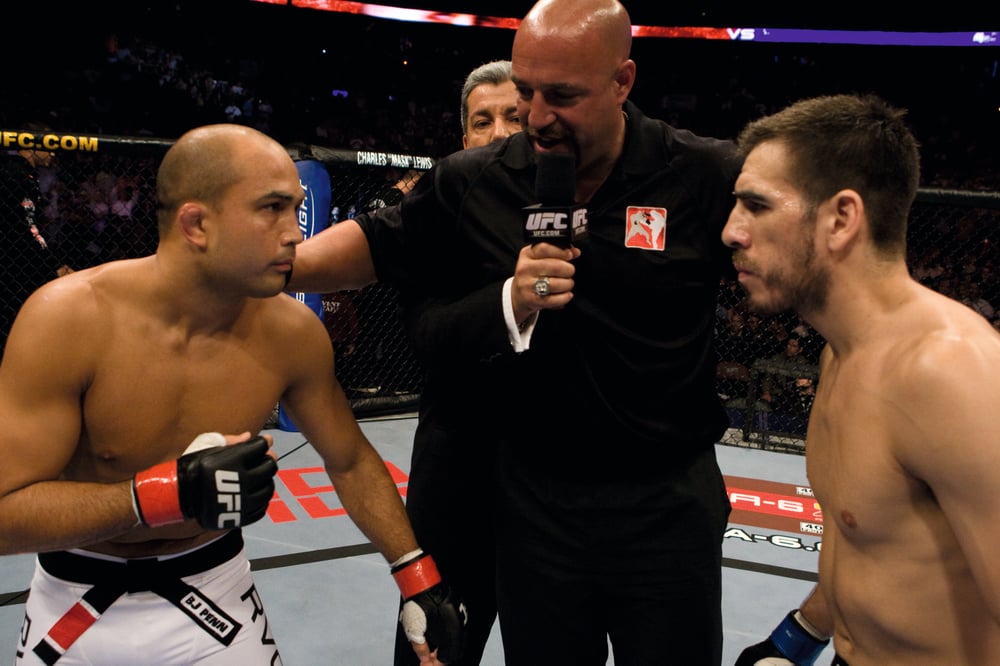
Psychologist Joe Bell elaborates on Borum’s point, questioning whether Michael Bisping has the necessary mindset to follow St Pierre’s blueprint for success after his first-ever knockout loss, at the hands of Dan Henderson. “St Pierre is a self-reflective individual who acknowledged he had things to work on, he went away and corrected them and came back as one of the best fighters in the world,” comments Bell. “Michael Bisping, on the other hand, suffered a knockout that came as a result of a novice error – but look for any post-fight reaction and it is extremely hard to find.
“That says to me that he is licking his wounds. I think for the first time in Michael’s career he experienced fear. Bisping is a really fit lad, but at the end of round one his hands were on his knees and what he was experiencing was an adrenaline dump caused by fear. He felt Dan Henderson’s power and he knew his own punches weren’t as hard as that. If Bisping gets ahead and sets the tempo of a fight, he is one of the best in the business at staying ahead, but at that moment when he gulped in those deep breaths, he was thinking ‘shit’, and that was when the fight was lost.”
Bisping is not the first man to face adversity and come back strong. MMA has produced a highlight reel of winners and losers over the years, images of the broken Jens Pulver sitting at BJ Penn’s feet, or the grinning Kazushi Sakuraba reduced to a bloody mess, sit right alongside images of an adrenaline-pumped Brock Lesnar, or jubilant Anderson Silva. The psychological warfare waged pre-fight is usurped only by the mental examinations posed post-fight, but one thing is for sure: Only the strongest characters survive.
TRASH TALK
Getting under your opponent’s skin is the oldest trick in the book and the only time the gloves truly come off. Depending on what you think, it can also be the most entertaining part of MMA!
Offense
A fighter’s ego is usually over inflated (it’s the nature of the beast), but the ego is often very fragile and the trick here is to lure it out into the open and then pummel it! Focus on your rival’s flaws; “The chump’s got a lame ground-game, has a glass jaw and zero punching power!” One sure way to piss the other guy off is to mock his physique, and possibly even question his manhood. Verbal blows like these can rattle even the most composed fighters.
“I reject the challenge, because Balboa is NO challenge” – Clubber Lang ROCKY III
Defense
Know this tactic is designed to do one thing, invoke a negative emotional response: Anger. Anger clouds focus and can drain vital energy from the body, leaving you wide open to attack. Attention is focused on shutting the other guy up, and not where it should be, namely the moment. Be aloof and dissociate yourself from all negative dialect, this way you’ll appear unfazed, calm and collected, and this will unnerve your counterpart. Leave the trash talking to the amateurs, do yourself and the sport a favor, and let your fists do the talking.
Psyche-Out City - Five of the sport’s most effective psychological combatants
Wanderlei Silva
‘The Axe Murderer’s’ legendary stare-down won him many fights before a single punch had even been thrown. His intense gaze intimidated his opponents to the degree that, by the time the bell rang, the result was a foregone conclusion. During the Pride era, Silva’s menace was legendary. His mystique may have dulled with age, but in his peak Wanderlei remained unbeaten for almost five years, largely due to his powerful mindset.
Chuck Liddell
Chuck’s not nicknamed ‘The Iceman’ for nothing. He’s not a big trash-talker, and is invulnerable to his opponent’s verbal potshots. The epitome of laid-back California cool, try as they might his opponents simply could not get under his skin. For those who relied on mind games to win fights (think Tito Ortiz), this meant that by the time they got in the Octagon the odds were heavily in Liddell’s favor.
Kazushi Sakuraba
Crafty, playful and enigmatic, Kazushi Sakuraba wasn’t just a talented grappler – he was also a master at getting into his opponent’s heads. He would famously enter the ring wearing a mask, dressed identically to two other men, only removing his mask seconds before the fight. This tactic may have seemed pure showmanship, but it would immediately send his opponents into a state of confusion, which he would continue through the fight with his unorthodox moves.
Diego Sanchez
Few fighters can match Diego Sanchez’s intensity, before or during a fight. Known for his incredible focus, Sanchez will repeatedly punch the air and yell ‘yes!’ during his walk to the ring. The mindset he creates puts him in an extremely strong state of mind where the thought of losing doesn’t exist. Sanchez worked with self-help guru Tony Robbins to help develop this ability, and has lost only twice in a seven-year career.
Frank Shamrock
Shamrock pioneered many things in the sport of MMA. During the late ‘90s he proved that conditioning was of paramount importance, that a good all-rounder could beat a fighter with one specific talent, and that getting into your opponent’s heads could sway the balance of a fight in your favor. Shamrock would often use humor to disempower his opponents and even talk to them during a fight, much like the great Muhammad Ali.
POWER OF SUGGESTION
The power of suggestion can influence an opponent on a subconscious level, causing them to mentally throw in the towel before the fight even starts.
Offense
If this technique is confidently and consistently executed (ideally face-to-face), it cements the fact that you are going to humiliate, punish and knock your opponent out, reaffirming what they fear the most, ‘defeat’. This causes a mutiny within the mind, with the subconscious reprogramming the body to surrender while the conscious mind thinks it has a handle on the situation (until it’s too late).
Defense
Suggestion attacks self-confidence without you knowing it, so be mindful when an opponent squares-up before or even during a fight and repeats or gestures the same threat in a variety of ways, e.g. “I’m gonna put you to sleep” or “lights out”. Be aware he’s trying to tune into your subconscious, so to defend against this let loose your mental cues to boast confidence. Say to yourself, “I’m stronger and faster”, “I’ve got better hands”. To freak your opponent out, say these aloud every time he speaks – he won’t have a clue what you’re on about.
THE SAMURAI CODE
This is deceiving and devastating – by lulling your rival into a false sense of security, you are poised to unleash a ferocious calculated attack they won’t see coming.
Offense
Honor, respect and even pay tribute to your adversary’s skills, they’ll assume this means friendship, and friendship implies give and take. The only thing you’re going to give them is a beating, and the only thing you’ll take is their pride. Your opponent will likely think you’re a pushover and underestimate you. What he doesn’t know is that, were your gloves a sword, you’d gladly chop his head off. The moment you touch gloves become the samurai – show no mercy and be relentless. This can throw your foe into psychological turmoil.
Defense
Rule 1: Do not underestimate your opponent. Expect the unexpected, whether it’s your brother, best friend, training partner or fellow warrior; treat them all with the same amount of respect and caution. This isn’t tennis, this is mortal combat, and if you treat an opponent with an ounce of disregard then you deserve the beating you’re due.
Tips provided by Joe Bell.


